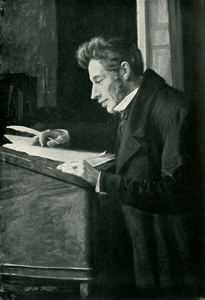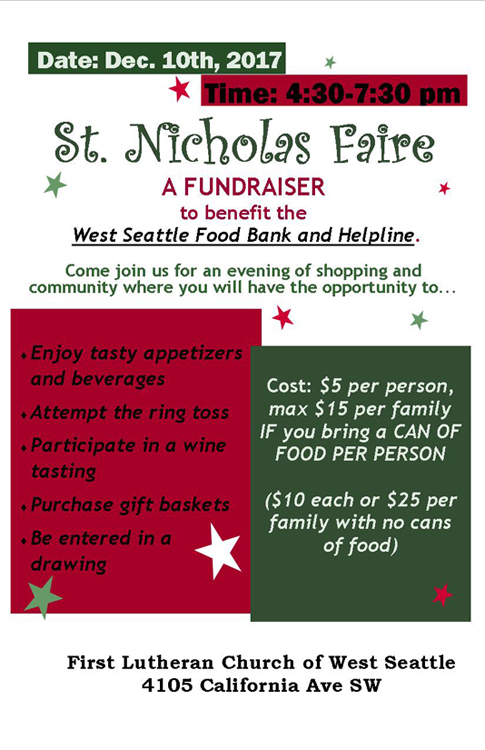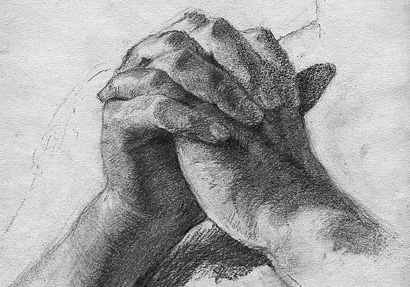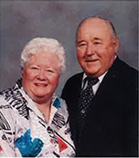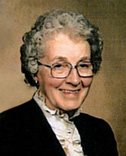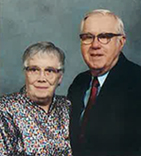November 2017
|
On November 12th we will commemorate Søren Kierkegaard (1813–55)
as we have every year since 1980. He was a Danish Lutheran
writer known for his deep commitment to Christian discipleship.
|
|
PRESIDENT'S REPORT...by
Bob Baker
Feeling “Bah, Humbug” about
the St.
Nick
Faire?
Do you get tired of hearing about the Saint Nicholas Faire? The
expense. Months of preparation. Hype and ballyhoo. On and on.
What about doing something else for a change, something
different? Wanting something new and different is a basic human
predilection that even Luther knew about.
Try a remedy? No, this remedy is not “discontinue it.”
The remedy I have in mind gets rid of the Blahs! Get Excited.
Motivated. Involved. Better yet, a painless remedy! The Remedy?
Simply visit the
West Seattle Food Bank
(WSFB) during operating hours on Tuesday through Friday, best
between 10 AM and 1 PM.
See that vital place in action. Meet dedicated staff
people. Meet knowledgeable volunteers. Meet grateful clients.
Observe the interaction between staff, clients, and volunteers:
Respectful, Helpful, Caring.
What does respectful, helpful, and caring look like?
Well, for example, instead of a line of people walking in and
being given a prepackaged bag of food—which
may not meet their dietary needs or cultural preferences—instead
you walk in and find yourself in a compact grocery store with
shopping carts—yes,
shopping carts—and
organized shelves of food, a refrigerator section, and a freezer
section. Everything is color coded and labelled for quantity
allowed according to family size, etc. Plus a whole section for
baby needs.
In an area that seems nearly as large, a team of
volunteers sorts through and organizes donations. A considerable
amount comes in from grocery stores, restaurants, bakeries, and
food recovery efforts—but
not all of it is usable. So much comes in after the weekend that
all of Monday is spent sorting, keeping what is usable, and
getting ready for that week’s distribution. What an operation!
Over 900 families a week are served. Over 100,000 lbs. of
food a month are distributed. Last year 8,400 individuals were
served, including 3,200 children and 1,200 seniors. The muscles
of the operation last year were 455 volunteers who put in 22,860
hours of volunteer service.
Yet there is more! The WSFB also delivers food to shut
ins and other people without means of getting to the food bank.
All of this, and more, continues week after week, month after
month, thanks to donors who make the whole operation possible.
Getting tired of fundraisers? Maybe so, we are constantly being
asked to support this or that worthy cause, but I suspect you
feel less stressed than the person who fights hunger daily and
often goes to sleep having lost the fight that day.
Visit the WSFB. Get energized to do and donate even more.
St.
Nick,
I want to be one of your elves!  |
St. Nicholas Faire
Sunday, December 10th, from 4:30 pm to 7:30 pm
The feast day of St. Nicholas is coming soon and preparations
are moving full steam ahead.
All we need is
YOU!!! Plus we
need your friends and family to come and enjoy the festivities
too. Please plan to
join in the celebration.
We have gift baskets to bid on – kitchen items, tea, “handy-man”
items, children’s activity books, Italian items, wine, Hello
Kitty, storage containers, Mariner memorabilia, and Seahawks
gear – just to highlight a few. And we have gift cards to local
merchants for purchase, always a good idea for that person on
your list who has everything.
Plus there will be a ring toss game and wine tasting for
a nominal donation.
Admission, which helps defray any costs of putting on the event,
is $5 per person or $15 per family if each attendee brings a can
of food, and $10 per person and $25 per family if you do not
contribute a can of food for each person. (Just a piece of info
- all of this money is usually given to the Helpline and Food
Bank because donors help pay the cost of hosting the Faire.)
New this year when you pay your admission, you will be given a
BID NUMBER to use on the Silent Auction item bid sheets.
This should help to protect the privacy and security of
all bidders.
See you Sunday, December 10, 2017 from 4:30 pm to 7:30 pm! |
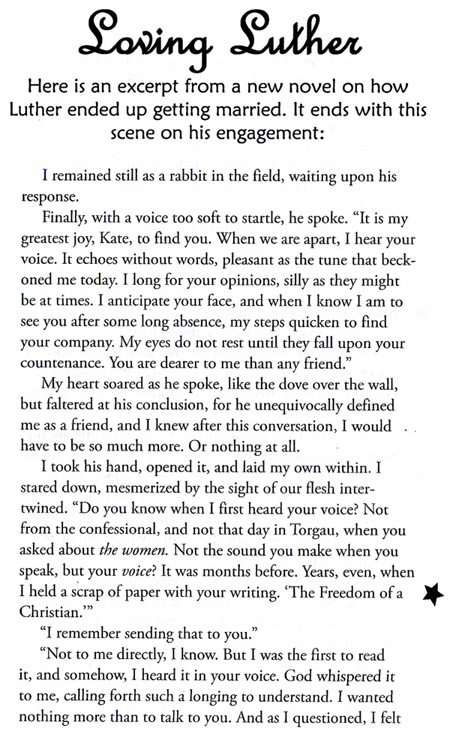
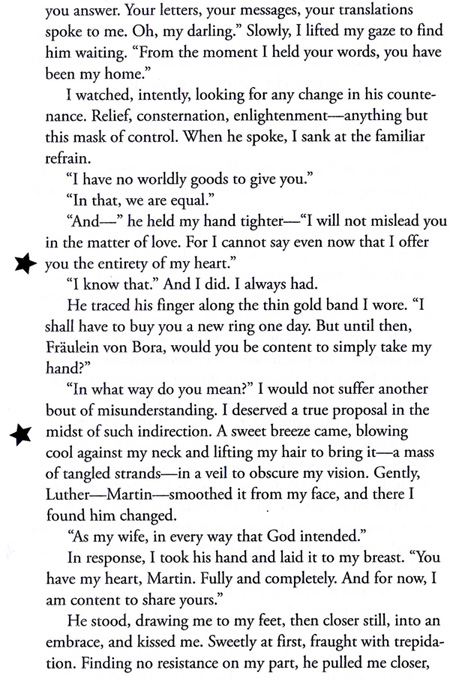
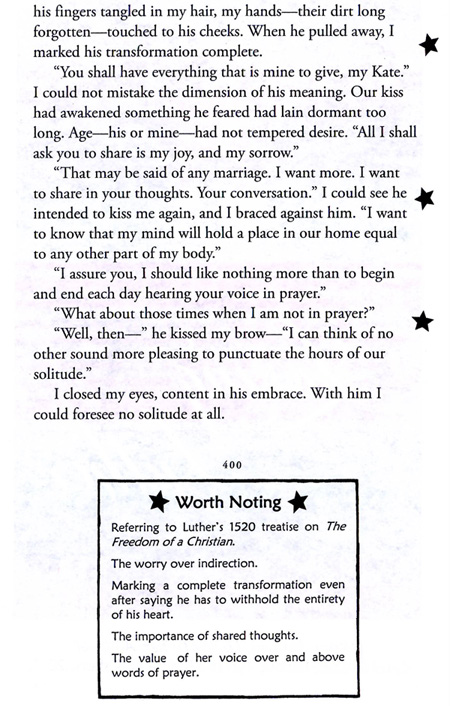

STEWARDSHIP
Faithful Stewards
Let’s think about the choices we face today.
Will our choices help us walk in the path of our loving
Lord or lead us astray?
One path may lead to blessings for ourselves and for
others, and help someone meet Jesus.
One path may lead to adversity or painful consequences.
When the choice is difficult we can call on the spirit for help
making the best decision, not only for ourselves, but also for
the sake of those whose lives we may influence.
Loving God, help me remember to pray about
the decisions I face today and to always be an unwavering
Steward. In Jesus’
name. Amen.
Melanie Johnson, Church Council |
November Book
With the Mind:
Readings in Contemporary Theology The book for November is The Reformation: A Very Short Introduction (2009) by Peter Marshall, professor of history at the University of Warwick. In this little book, Marshall summarizes what historians have made of the impact of the Reformation over the years. His conclusion is that its primary outcome is “division and the emergence of strategies for coping” with it (133). This supplants the older view that the Reformation resulted in “modern capitalism, the concept of political freedom, the advancement of science [and] the decline of magic and superstition” (129). A copy of this useful little book is in the library. If you would like to purchase one for yourself, contact Pastor Marshall. Feel free to attend our meeting when we discuss the results of the Reformation. |
Ephesians 4.1
Monthly Home Bible Study, November 2017, Number 297
The Reverend Ronald F. Marshall
Along with our other
regular study of Scripture, let us join as a congregation in
this home study. We will
study alone then talk informally about the assigned verses
together as we have opportunity. In this way we can "gather
together around the
Word" even though physically we will not be getting together
(Acts 13.44). (This study uses the RSV translation.)
We need to support
each other in this difficult project. In 1851 Kierkegaard wrote
that the Bible is "an extremely dangerous book.... [because] it
is an imperious book... – it takes the whole man and may
suddenly and radically change... life on a prodigious scale" (For
Self-Examination). And in 1967 Thomas Merton wrote that "we
all instinctively know that it is dangerous to become involved
in the Bible" (Opening the Bible). Indeed this word "kills" us (Hosea 6.5) because
we are "a rebellious people" (Isaiah 30.9)! As Lutherans,
however, we are still to "abide in the womb of the Word" (Luther's
Works 17.93) by constantly "ruminating on the Word" (LW
30.219) so that we may "become like the Word" (LW 29.155) by thinking "in the way Scripture does" (LW
25.261). Before you study, then, pray: "Blessed Lord, who caused
all holy Scriptures to be written for our learning: Grant us so
to hear them, read, mark, learn, and inwardly digest them, that
we may embrace and ever hold fast the blessed hope of
everlasting life, which you have given us in Our Savior Jesus
Christ. Amen" (quoted in R. F. Marshall,
Making A New World: How
Lutherans Read the Bible, 2003, p. 12). And don’t give up,
for as Luther said, we “have in Scripture enough to study for
all eternity” (LW
75:422)!
Week I.
Read Ephesians 4.1 noting the phrase
lead a life worthy of the
calling to which you have been called. Why isn’t faith
enough? Why do we also have to live a certain way? On this read
Ephesians 2.10 noting the words
for,
works,
should and walk. Why does
faith require works? On this read Ephesians 4.20 noting the line
you did not so learn
Christ. What is there about Christ that requires works to
follow faith? On this read Ephesians 5.2 noting the line
walk in love as Christ
loved us. Does this mean that loving behavior is required of
all who believe in Christ because he was a loving man? On this
read Ephesians 2.15 noting the line
create in himself one new
man. How does faith in Christ lead to such a new creation
for us? On this read Ephesians 3.14–19 noting the words
riches,
strengthened,
inner, dwell,
hearts,
rooted, love,
power and
fullness. So faith brings individual strength now as well as the
opening up of heaven
as is stated in Hebrews 10.20. Do you agree?
Week II.
Read again Ephesians 4.1 noting again that
worthy life. What is
it composed of? On this read Ephesians 4.22 noting the
old nature and former manner of life made up of deceitful lusts. What’s wrong with those
deceitful lusts? On this read Ephesians 5.6 noting the line
deceive with empty words.
What’s empty about them? On this read Ephesians 5.16 noting that
we are to make the most of
the time because it is
evil. So it would be a lie, or deceit, to encourage time off
and easy living. On this read Ephesians 6.18–20 noting the words
alert,
perseverance, boldly and
ought. No time off
here. No laziness allowed in this life. Why is that? On this
read Ephesians 6.12 noting the words
contending,
world, rulers,
darkness,
hosts and wickedness. Why
is this such a struggle which needs our undivided attention? On
this read Ephesians 5.11 noting the word
expose. How is this
done if there isn’t any cooperation? On this read Ephesians 5.13
noting the phrase exposed
by the light. How does it do that? On this read Ephesians
5.14 noting the line
Christ shall give you light. And what is it? On this read
Ephesians 5.9 noting the words
good, right and
true. Does that settle
it?
Week III.
Reread Ephesians 4.1 noting again that
worthy life. What else
is in it? On this read Ephesians 4.23 noting the line
be renewed in the spirit
of your mind. What does that entail? On this read Ephesians
4.26–28 noting the words
angry and give. How do those words renew our minds? Not being angry changes
our disposition. On this read Ephesians 4.32 noting the line
forgiving one another as God forgave you. Thinking like that veers
clear of anger. And regarding being generous and giving to those
in need, that changes your character. On this read Ephesians
4.13 noting the line
attain… mature manhood, to the measure of the stature of the
fullness of Christ. With that fullness you can be generous
with the poor – since there’s no scarcity of spirit in you. How
does all of this renew the mind? On this read Ephesians 5.17
noting the play between the words
foolish and
understand. A renewed
mind isn’t foolish. Instead it hankers after God’s will. Sound
right? |
Praying Seven
Times a Day
Pastor
Marshall
June 2004
Revised
November 2017
DAWN
O Lord, we
thank you for this new day and for keeping us safe through the
night. In Jesus
name we pray. Amen.
Morning
(8am)
Father in
heaven, guide us all this day long so that we may do what is
pleasing in your sight.
In Jesus’ name we prey.
Amen.
Late
Morning
(10am)
O God, by
your Spirit open our minds so that we may learn anew your Word
and diligently follow it.
In Jesus’ name we pray.
Amen.
NOON
God the
Father of us all and King of the universe, we thank you for your
dear Son, Jesus Christ, his sacrifice on the cross and our faith
in him that saves us from being eternally punished for our sins.
Amen.
AFTERNOON
(3pm)
In your
mercy, O Lord, bless your Church, break the devil’s hold on us
and through your Spirit lead us and all people into your
kingdom. In Jesus’
name we pray. Amen.
EVENING
(6pm)
O God, for
Jesus’ sake, have mercy on us and forgive our sins and the evil
we have done this day.
Amen.
BEDTIME
Grant us your
peace, O Lord, through the hours of this night and at the end of
all the ages. In
Jesus” name we pray.
Amen.
NOTES
1. Psalm
119:164 says we should pray seven times a day.
These seven little prayers are one way to do that.
Martin Luther said this verse from Ps. 119 expressed “our
ceremony of hours,…. The daily universal praise, since seven is
the number of the universe.”
He also noted that “many bless God but only when He does
good to them…. But not so the spiritual man…” (Luther’s
Works 11:525, 524).
These prayers help you pray through thick and thin and
not only when you’re happy.
2.
In The Rule of
St. Benedict of Nursia (480-550), Chapter XVI, the seven times
for daily prayer in the monasteries were: Matins, Prime, Terce,
Sext, Nones, Vespers and Compline.
They began in the middle of the night around 2 am.
So using Psalm 119:164 has been a long-standing practice
in the church and should continue to be.
3.
The times I have suggested are not the only ones to use.
Make adjustments as you wish.
They are flexible.
Just keep the seven separate times each day.
4.
The words also are not the only ones to use.
Make up your own if you wish.
You should try, however, to address a different theme in
each of the seven prayers.
5.
My prayers are brief. This is to make them easier to
memorize.
Memorizing them helps you say them wherever you are when the
hour of prayer strikes.
Remember that Luther believed prayer should be “brief,
frequent, and intense” (LW
21:143). In St.
Benedict’s Rule,
however, each hour of prayer lasted an hour or so being filled
in with singing, praying and reading Holy Scriptures aloud.
If time permits, that would be good to do.
Materials from the
Lutheran Book of Worship (1978) can be used to add to these
small prayers provided here.
6.
I use the pronoun “we” in these prayers.
I do that to show our church praying together.
These are not to be private prayers even though for most
they will be prayed alone.
7.
R. R. Reno has recently written that these prayers, or
ones like them, are “the womb of our new life in Christ” (In
the Ruins of the Church: Sustaining Faith in an Age of
Diminished Christianity, 2002, p. 155).
So these prayers hold great promise.
God bless you in your discipline of daily prayer.
8.
And if you want to study more on the ins and outs of
prayer, check out my Chapter 10 in
Kierkegaard for the
Church (2013), especially footnote 21 on true prayer
standing over against “dreamy loitering” over God.
|
|
ANNOUNCEMENTS: HOLY EUCHARIST – THANKSGIVING EVE: Thanksgiving will be observed with Holy Eucharist on Wednesday, November 22rd at 7 pm, in the chapel. Compass Housing Alliance is in need of Christmas gift items for their housing centers for both men and women. Listed here are the items we will be collecting over the next couple of weeks: gift cards in $5 to $25 increments for fast food restaurants, coffee shops, Target and grocery stores; new sweatshirts (L, XL, XXL sizes with the tags on), underwear, flip-flops, hats, |
|
scarves and gloves (in dark neutral colors).
New toiletries in
small sizes are always needed. Please leave your donations at
the office. The items collected will be delivered after Sunday,
December 10th.
FREE MONEY?
Sign up for the
Bartell Drugs Scrip
program and designate First Lutheran Church of West Seattle.
4% of your purchases will be automatically donated to the
church. Also
Amazon.com has a program called
Amazon Smile that one
can sign up for.
FLOWER CHART:
There are still a few spaces left for Christmas flowers.
Are you able to help this time?
FOOD BANK COLLECTION
suggested donation for November is holiday foods: canned yams,
turkey, gravy, cranberries, stuffing and pumpkin.
|
 |
|
X All Saints’ X Join us this year for the All Saints’ Litany, Wednesday, November 1st, for our Columbarium Liturgy and Holy Eucharist. Plan to attend this solemn occasion at 11:30 am in the chapel. |
Melting Frosty the Snowman
and Overturning the Calamity of Christmas by
Preaching Søren Kierkegaard’s
Sickness Unto Death
(1849)
By Pastor Marshall
October 2017
WITH ALL THE GOOD CHEER
going around at Christmas time, it’s hard to believe that God
gets into “hot water” this time of year (118)? But that’s
exactly what happens. And so I suppose that no good deed goes
unpunished (Oscar Wilde)—even when it’s God’s. For Christmas is
grace, mercy and blessing (John 1:17)—but in our hands it
becomes a curse. For God’s largess is “repaid with ingratitude”
(118) (Hosea 13:6). So God gets into trouble because of us
(Isaiah 55:8, Romans 1:25).
But how so? Well, when God tightly links himself to his
only son, Jesus Christ, in the holy incarnation in the barn at
Bethlehem, it boomerangs on him. That’s because we take the
miracle for ourselves, rather than celebrating Jesus as we
should. By so doing peanut brittle wins out over the bread of
life (John 6:35). Then the “likeness between God and man”
revealed at Christmas, degenerates into “flippant or brazen
forwardness” (121) (Hebrews 10:31). Our over-heated theological
misappropriations melt ol’ Frosty the Snowman, if you will—one
of the cultural icons for Christmas. We take advantage of God’s
incarnation and use it for our own self-aggrandizement (2
Corinthians 6:1)—thinking that if God becomes man in Jesus at
Christmas, then all humans everywhere are hot shots. By so
doing, we turn Christmas into our exaltation or “apotheosis”
(73)—rather than preserving it properly, as the very
glorification of Christ, the miraculous savior (Matthew 1:21),
the only divine and human mediator (1 Timothy 1:5). In the name
of Christianity, we then are “absorbed in all sorts of secular
matters” (33). We take Saint Athanasius’ famous dictum from the
4th century that God became man so that we might become God (Catechism
of the Catholic Church, 1999, §460) and twist it all
around—turning Christianity into pantheism (117). We become
“brazen” (118) in exalting ourselves and using Christmas to
defend ourselves and to explain our first rate promotion (John
3:30). Then the likeness between God and man at Christmas
“merges into one” (117)—turning likeness into identity.
In this way we use Christmas “as an ingredient in human
importance, in becoming self-important directly before God….
Everything that in the old days was regarded with horror as the
expression of ungodly insubordination is now regarded as genius,
the sign of a deep nature.” Now “the Christian conceptions float
free unchristianly in the air, they have been used for the most
aggravated rudeness.” Now “God’s name is the word that most
frequently appears in daily speech and is clearly the word that
is given the least thought and used most carelessly, because the
poor, revealed God (who instead of keeping himself hidden, as
the upper class usually does, was careless and injudicious
enough to become revealed) has become a personage far too
familiar to the whole population” (115–16). Now subordination to
God has given way to some sort of contrived, holy,
insubordination (Isaiah 5:20). Now the command to obey God has
given way to an invitation to imagine new worldviews. This is
the calamity of Christmas! Obedience to God is lost in the
“vagueness [of] high-powered psychological investigations to the
nth degree” (78–79). That’s because rational analysis “snips off
a little bit from both sides and thereby gets along more easily”
(100). And so we have a jumbled mess—the “prostitution of
Christianity” (102).
Using Christmas in this illegitimate, rational way, leads to an
“overestimation of the things of this world to the extent that
the eternal can be no consolation” (70). Bereft of the eternal,
we have “no power over” ourselves (68) (John 6:68). We have
become “an imaginatively constructed god.” “In so far as the
self … works itself into the very opposite, it really becomes no
self.” Now the self is “its own master, absolutely its own
master,” and in this is “its pleasure and delight” (69).
But this pleasure is “fleeting” (Hebrews 11:25). Its
“proficiency in imaginative constructing does not stretch that
far, even though its proficiency in abstracting does; in a
Promethean way, the infinite, negative self feels itself nailed
to this servitude” (70). These pleasures are only “glittering
vices” (46). For when “the illness is most critical,” the sick
person feels well, and “considers himself to be in excellent
health” (45).
Is there, then, any way to save Frosty from melting—so to speak?
Can we get God out of the hot water and stand the snowman
upright again? Yes, but one must give up on being one of the
superficial, nominal “cultured Christians” for that to happen
(56). More diligence is needed. All “sinful watering down” has
to be thrown out (95). A “most rapturous love” for God has to
take over (103). But moving away from the natural, animal way of
life never comes simply as “a matter of course” (58). No, the
self “must be broken” first (65)—so it can “dare to believe”
(113). “Lost in possibility” and the heights of imagination,
with “ever greater ingenuity” (98), we have to turn around and
regain “the power to obey” the Lord God Almighty (36). We have
to eschew our “selfishness and pride” (112). This will take
“humble courage” (85) to move beyond the “natural man [with its]
merely human self” (81). That’s because our problem is
“self-willfulness against God, a disobedience that defies his
commandments” (81). So we need to “hear and understand” and be
willing “to follow every least hint from God as to his will” for
us (82). But alas, “most men probably live…. either in a certain
endearing childish naiveté or in shallow triviality” (107).
Against this we must become obsessed with God—made mad by his
presence and anything but well-balanced and moderate (34, 38,
56, 57, 72, 84, 86). All “flabby and spineless” Christianity has
to be done away with (96). We must kill our “selfish self” (81)
and take up a new “theological self” (79).
Furthermore when Christmas is degraded and stripped of its
offensiveness by allowing for “man’s coming too close” to God
(125), then all hope for a life with God is gone. We can’t
“humble” ourselves and believe (78). And so a “sickness of the
self” settles in (21). Here there is no “consciousness of the
eternal” that causes a break through, so that the “battle” of
faith may begin in us (60)—and faith may indeed be “found on
earth” (129n). Then one opposes going the way of “thousands upon
thousands [who confirm] that one can have faith in Christ
without having noticed the slightest possibility of offense”
(128n). And what is that offense which is so essential yet
missing among so many would-be believers? Just what is it that
frosts us and pulls us away from faith?
The offense is that God is not “the fond father who indulges his
child’s every wish for too much” (78). And that divine
unwillingness, which has to do with our sinful longings (87), is
“diametrically contrary to” the escape speculation wishes for
(120). Sin indeed is what blocks the easy and “tiny little
transition from understanding to doing” (93)—and so also faith.
Here “the lower nature’s power lies in stretching things out,”
dodging the “decisions and conclusions” it doesn’t much care
for, and expanding “esthetic and metaphysical comprehension,
which ethically is a diversion” (94). The offense in this is
that our reasoning—incapacitated by sin—fails when it comes to
God (Matthew 11:25). That’s because our Savior Jesus “must be
believed” (95)—with not “one more word; there is nothing more to
add” (122). It can’t be rationally apprehended. For “to believe
is… to lose the understanding in order to gain God” (38). God in
Christ must be miraculously revealed and believed in (John
3:16). We must not first wait around for some theological
“champion” to defend and explain Christianity to us, which we
would otherwise imagine to be a “poor, miserable” Christianity
(87). No, we must believe without anyone helping us first
(Philippians 2:12). We must leap into the waiting arms of
God—showing “courage to lose” our lives in order to win them
back—redeemed in the eyes of God (67). For it is “insolence… to
want to comprehend that which does not want to be comprehended”
(98). In this way—underscoring this offense—we keep watch “so
that the gulf of qualitative difference between God and man may
be maintained” (99)—precisely what Christmas threatens to take
away. Admitting to a severe account of sin is what keeps this
gulf more radical “than ever before” (121). And those who go
this way aren’t marked by “popularity” but “insignificance”
alone (128)—and faith.
Now why did God take such a risk knowing that we would
surely be “reaping the harvest” of degradation through it (119)?
Well, it was all for Christ and our salvation in him by grace
through faith (Ephesians 2:8). God dared the incarnation for
that alone—so we could “come to him… in Christ” (125). Our
kinship with him through the incarnation of Christmas was never
to extend beyond that point of contact and for that purpose (1
John 4:10). For without this connection there could never be any
“reconciliation” with God (120n) and faith. Only through the
death of Jesus on the cross “for the sake of us” all (113)—can
the punishment of sin be clearly ended, as if it were finally
“drowned in the sea” (100).
And just as God “protects” the incarnation with the
offense of sin (117, 125), so we must also do the same through
faithful preachers—those who make their lives and ministries
“concerned and accountable in fear and trembling,” and thereby
become “a nuisance to others” (123). We need pastors like this
because most people “never advance beyond what they were in
their childhood and youth: immediacy with the admixture of a
little dash of reflection,” since to become spirit “seems to be
a waste of time” (57). We need pastors, then, to push us beyond
where we want to go—by splitting up those merged categories (2
Timothy 4:3).
But alas, pastors have been “deserted by every elevating
conception,” reducing their office to “a way of making a living,
devoid of the slightest mystery.” And so they’re “no different
at all from being a merchant, lawyer, bookbinder, veterinarian,
etc. on weekdays” (102). They are without faith and “rapturous”
love for God in Christ. That’s why they don’t care to speak
about Christ “all day long and all night, too” (103). They would
rather give reasons for belief, with distant, intellectual
acuity—through a phony form of “preaching” (104, 130). But a
lover, in his right mind, would never “think of conducting a
defense of his being in love.” That’s because by so doing he’s
saying that his love is “not the absolute, unconditionally the
absolute” (103). Therefore defending love fails because the
lover is “more than all reasons and any defense: he is in love.
[And anyone who defends love] is not in love; he merely pretends
to be, and… he is so stupid that he… informs against himself as
not being in love” when he tries to defend his love (104).
Such pastors don’t care about diligence (Matthew 22:37).
All they ask for is that you go to church “every once in a
while,” and then, on behalf of God, get thanked “for the honor
of the visit” and favored “with the title of pious” (116). They
don’t push the people on to confession and forgiveness of sins,
but let them go on “happily in pagan peace of mind” (117). These
dull, inoffensive pastors are happy if everyone in church simply
becomes a “copy” of each other (52, 101) (2 Corinthians 3:17).
For it is “dangerous to venture” out individually—and so “not to
venture is prudent” (34). That’s because the world thinks
Christianity is “too high, because its goal is not man’s goal,
because it wants to make man into something so extraordinary
that he cannot grasp the thought” of salvation (83). And so they
drop all “earnestness of existence” (130) and “reassure”
everyone of their salvation (57). By so doing these cowardly
pastors avoid “every gust of unfavorable wind” (91). And so they
come across like they “really do not know what they are talking
about” (64).
By way of all of these negative examples and admonitions
against them, we know what good pastors are. May God have mercy
and send us such pastors (Philippians 1:6), so that “the
infinite, chasmal, qualitative abyss between” God and his people
is “confirmed” by their ministries (129), and that God’s no
longer in “hot water” (118), and our differences with him are
firmly set (99)—and Frosty’s left standing. Amen.
(References to the Hong & Hong edition of SUD, Princeton
University Press, 1980.) |
|
Remember in prayer before God those whom He has made your
brothers and sisters through baptism.
Mia Schorn, Bob & Barbara Schorn, Asha Sagmoen, Melanie Johnson,
Kyra Stromberg, Marlis Ormiston, Eileen Nestoss, Emma Sagmoen,
Celia Balderston, The PLU Lecturers, Tabitha Anderson, Jordan
Corbin, Nell & Paul Sponheim, The Rev. Al Bidne, The Rev. Mary
Rowe, The Rev. Mert Johnson, The Rev. John O’Neal, The Rev. Kari
Reiten, The Rev. Paul Smith, The Rev. Pari Bailey, Ion & Galina
Ceaicovschi, Nathan & Les Arkle, Margaret Douglass, Chris &
Margeen Boyer, Sharon DeFray, Elizabeth Banek, Clinton Johnson,
Brian Mac, Jeanne Pantone, West Side Presbyterian Church, Diana
Walker, Jack & Sheila Feichtner, Michael Simonds, Karen Granger,
Lee & Lois Snook.
Pray for the shut-ins that the light of Christ may give them
joy: Florence Jenkins, C. J. Christian, Louis Koser, Anelma
Meeks, Dorothy Ryder, Lillian Schneider, Crystal Tudor, Nora
Vanhala, Mildred Nikula, Mary Goplerud.
Pray for those who have suffered the death of a loved one:
Pray that God will bear their grief and lift their
hearts: Pray for
Rachael Foster and family, daughter of
The Rev. Keith
Krebs. Pastor Krebs
served here at First Lutheran Church from 1964-1967.
Pray for our bishops Elizabeth Eaton and Brian Kirby Unti, our
pastor Ronald Marshall, our deacon Dean Hard and our cantor
Andrew King, that they may be strengthened in
faith, love and the holy office to which they have been
called.
Pray that God would give us hearts which find joy in service and
in celebration of Stewardship.
Pray that God would work within you to become a good
steward of your time, your talents and finances.
Pray to strengthen the Stewardship of our congregation in
these same ways.
Pray for the hungry, ignored, abused, and homeless this
November. Pray for
the mercy of God for these people, and for all in Christ's
church to see and help those who are in distress.
Pray for our sister congregation:
El Camino de Emmaus in the Skagit Valley that God may
bless and strengthen their ministry.
Also, pray for our parish and it's ministry.
Pray that God will bless you through the lives of the saints:
Saint Andrew, the Apostle.
|
